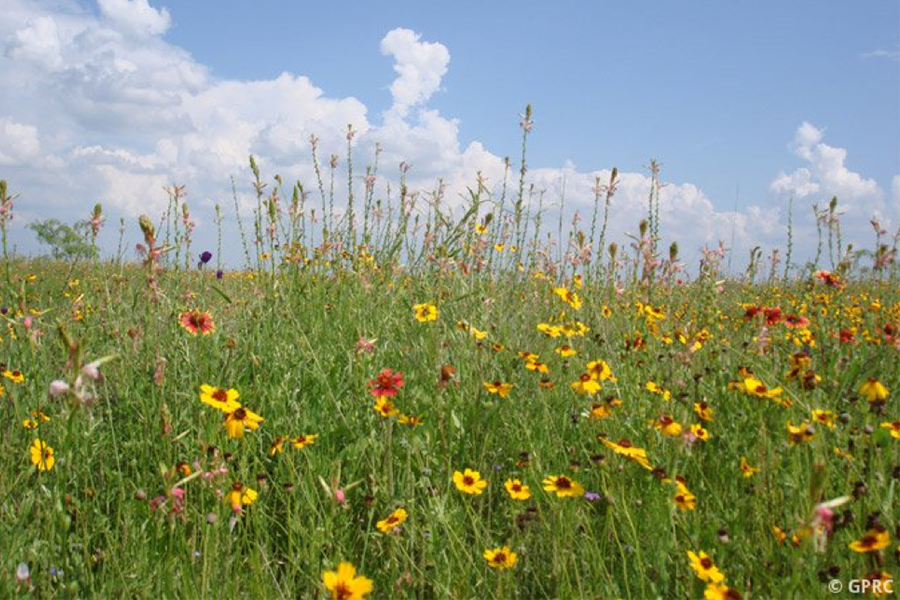
Great news!
The Great Plains Restoration Council just signed a Memorandum of Understanding with the U.S. Army Corps of Engineers to protect and restore over 700 acres of rare ancestral grassland that is over 10,000 years old and can serve as the ecological heart of the Fort Worth Prairie Park effort. And through the National Environmental Policy Act process, GPRC organized public support for updating the first General Management Plan of the land in 45 years, advocating that all wild prairie on the site be designated as Environmentally Sensitive Areas.
The Fort Worth Prairie is one of the rarest ecosystems in North America, a unique prairie comprised of both tallgrass and shorter grasses on the Southern Plains’ 98th meridian where the American West begins. The development has destroyed most of it but GPRC hopes to add additional acreage while there is still time.
The Fort Worth Prairie will currently be the largest public prairie in North Texas, it’s on the backdoor of 7 million people, and it has North American importance. A mile away, GPRC are also working with a new local university to create a trail on their 40-acre tract of campus prairie which they have left undeveloped and will serve higher education and civic goals.
In addition, Restoration Not Incarceration™ is expanding and being studied and adopted by others, fulfilling a lifetime goal of GPRC:
GPRC helped Griffith University in Queensland, Australia adopt Restoration Not Incarceration™ practices and principles to address domestic violence and ecological needs.
GPRC is helping West Atlanta Watershed Alliance adopt Restoration Not Incarceration™ through a cool new joint initiative called Shark Therapy/”Live Like a Watershed” that connects people to rivers to oceans, protects watersheds and sharks, and culminates with an ecological surface-dive with sharks in the open ocean donated pro bono by Shark Addicts Diving. Georgia Aquarium has just committed the first seed funding, which will be doubled by the Patagonia match. A cultural theme of GPRC is “the prairie and the ocean are two halves of a whole”.
Three of us have been asked to present at the Yale University conference “Social and Ecological Infrastructure for Recidivism Reduction” on March 12 – 15, 2020. GPRC will speak at the opening plenary, as well as lead a subsequent panel “Restoration Not Incarceration: Lessons Learned from an Ecological Rehabilitation Program for the Formerly Incarcerated”. Dr. Christine Norton, a pioneer in eco-psychotherapy at Texas State University, and contributing author to the book Environmental Social Work, which has a chapter dedicated to the pilot program of GPRC’s Restoration Not Incarceration program, will be part of the team. This event is co-convened by Yale University and Boston College, and funded by the National Science Foundation.
Do you feel called to help GPRC continue their important work?
As you consider your year-end giving plans, consider making a donation to Great Plains Restoration Council so we can continue the important and essential work that helps the planet and those struggling or suffering, both animal and human alike. Your entire donation is tax-deductible and will be doubled.
Patagonia, one of our key supporters, will generously match every donation dollar for dollar if you donate online through this link by 11:59 p.m. December 31st. They will also cover all Network for Good processing costs so that 100% of donations go to work for you and our non-profit goals. Patagonia is an incredible company that really cares about people and the planet, and we are very grateful for their continued support.
Your support for the year ahead will help GPRC:
-Advance next steps of the flagship Fort Worth Prairie Park, including restoration and trails, that bring the prairie to a National Park-like refuge of prairie abundance and health, and expand conservation protections,
-Provide prairie restoration jobs, Ecological Health education, and nature-based work therapy for formerly incarcerated individuals and veterans
-Expand Restoration Not Incarceration™
-Promote global public concern for prairies
-Utilize advocacy, community engagement, literature, film, and the arts to advance the national conversation around protecting the Earth as a matter of our own health and well-being.
GPRC’s vision for the Fort Worth Prairie Park is for it to:
-Serve as a local and national epicenter for experiencing the wild pristine prairie
-Provide an easily accessible open grassland refuge for people and wildlife, including the endangered continental migrations of grassland nesting birds and Monarch butterflies
-Provide jobs and education in Ecological Health,
-Culturally support larger regional prairie preservation efforts, like the Southern Plains Land Trust (I’m a founding board member), which is working to bring back big wildlife like bison, pronghorn, deer and elk, and colonies of black-tailed prairie dogs on the shortgrass prairie in SE Colorado 200 miles from Amarillo.
This is done by providing an easily accessible experience of wild prairie at a time when few people have ever hiked in a wild prairie.
You can use the link below for your convenience and give today! Patagonia will double any dollar amount until the national cap of $10 million is reached. As of this writing, there is only $4 million left in the national donation pool.
https://www.patagonia.com/actionworks/grantees/great-plains-restoration-council/

